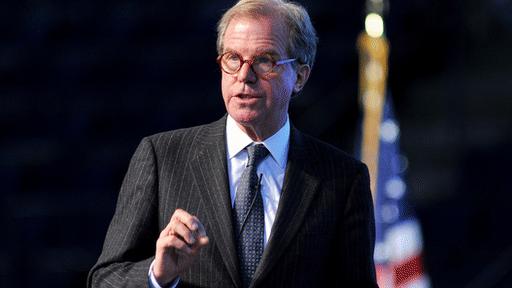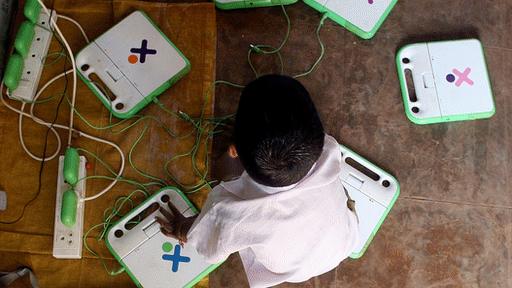Ted 2014: Negroponte on plans to connect last billion
- Published

Nicholas Negroponte will open TED 2014 in its new home in Vancouver
If the technology industry had celebrities, then Nicholas Negroponte would be on the A-list.
Best known as the founder of the Massachusetts's Institute of Technology's Media Lab and the driving force behind the One Laptop Per Child project, he now has ambitious plans to help connect the last billion people to the internet.
Ahead of Prof Negroponte's opening speech at the 30th anniversary Ted (Technology, Entertainment and Design) conference, the BBC was granted an exclusive interview.
He explained how he wanted to help provide free net access to Africa via low-cost satellites.
"It is a satellite system, first over Africa, that will serve, to start, 100 million people free, expanding to one billion. These people are the world's poorest and also the world's most remote. Namely, low density and rural. The idea is to do this in 18 months," he told the BBC.
"We can do it now, very inexpensively, without research and for less than $1bn," he said.
Prof Negroponte did not go into details about the project, but he is looking at a range of options, including low-orbit satellites.
But, unlike with the One Laptop Per Child project, he doesn't want to be in the driving seat.
"I am not trying to start another mega-project, but help others to do so," he said.
Swallowing knowledge
Prof Negroponte was chosen to open the 30th anniversary conference not just because of his heavyweight tech credentials but also because he spoke at the very first Ted in 1984.
Then he showed off primitive e-books and predicted that multi-touch screens would become standard.
He also predicted how CD-Roms and web interfaces would develop as well as pre-empt his own project to fund a cheap laptop for the developing world.
He is not about to predict what the next 30 years will hold, although there is one thing he would like to see come true - the ability to literally swallow knowledge.
"I am dyslexic and for that reason I feel that the normal human sensory system is very limiting," he told the BBC.
"We subscribe to the New York Review of Books at home and I look at the advertisements, love the book jacket designs in those advertisements and wish I had read most of the books. I can't, so swallowing them would be ideal," he said.
Insulting Apple
Ted is a conference attempting to bring together the three diverse worlds of technology, entertainment and design.
It has become synonymous with showing off cutting-edge technology, with many innovative designs launched on the Ted stage.
It attracts some of the world's most high profile people and this year's conference will see speeches from astronaut Chris Hadfield, Microsoft founder Bill Gates and musician Sting.
Speakers are very carefully chosen and their talks, often vetted beforehand, are restricted to 18 minutes.
But Prof Negroponte revealed that he may not be doing things quite as the organisers may like.
"Ted's insistence on written speeches, which I am ignoring, has become a weakness in my opinion. Talks today are too stilted, too tight, too homogeneous and too managed."
He is sure about one thing though.
"I am likely to insult a large number of people."
Chief among them may be Apple, for whom Prof Negroponte has very little time.
"They buy companies and then put everything into secrecy," he said.
"Even Microsoft, whom I do not admire generally, has a huge research lab that publishes widely and advances knowledge."
He knows what he doesn't like, so what has impressed him in the world of technological development over the past 30 years?
"Many things are astonishing, some in their myopia and some in their vision. The plethora of apps is amazing and GPS [global positioning system] applications terrific," he said.
He is not so convinced about artificial intelligence.
"The ability of machines to draw inferences and have common sense is abysmal."
Laptop project

The One Laptop Per Child project was an ambitious one to give children low-cost devices
Prof Negroponte was closely associated with the One Laptop Per Child (OLPC) project, an ambitious plan launched in 2005, with the aim of developing a $100 laptop to empower the world's poorest children.
Much of its raison d'etre has since been overtaken by the proliferation of cheap tablets.
He remains proud to have been associated with it.
"OLPC did what it had to do, with about three million laptops in 40 countries and 25 languages. People no longer ask if every child should have a connected laptop or tablet. They only ask how to pay for it," he told the BBC.
- Published19 October 2010
- Published22 May 2013
- Published21 March 2013